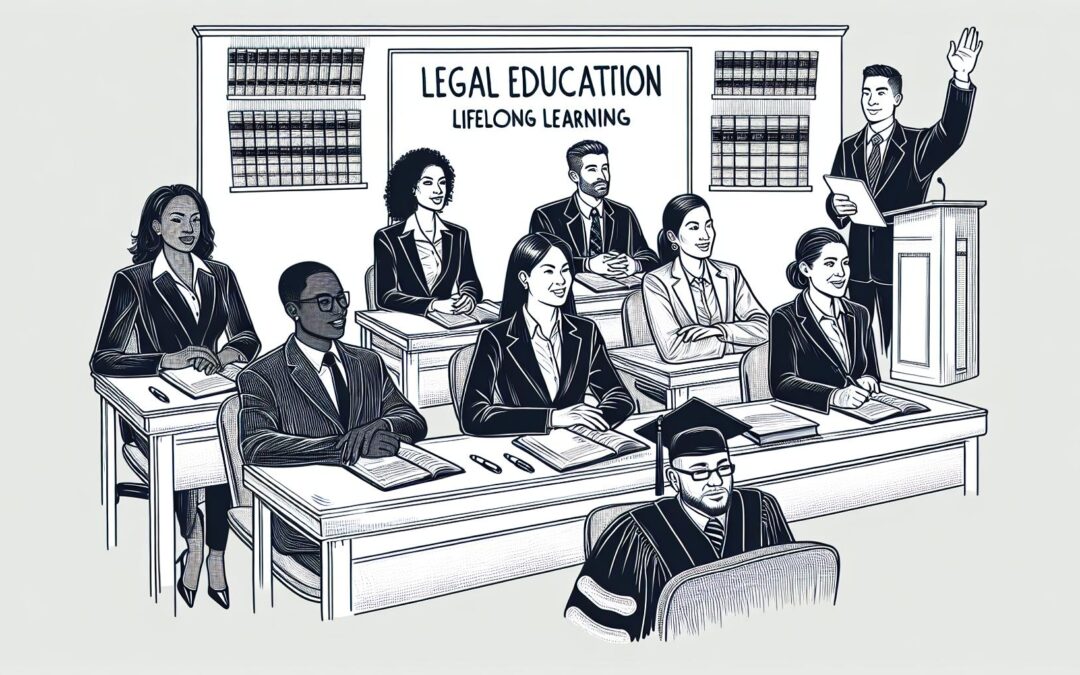In the world of intellectual property law, there is a unique concept known as pro se representation. Understanding this concept is essential for anyone navigating the complex landscape of patents, trademarks, and copyrights. This article aims to shed light on the history, relevance, and challenges of pro se representation in intellectual property cases. Additionally, we will explore key terms and definitions related to intellectual property law, examine the importance of protecting your intellectual property rights, and analyze real-life case studies of successful and unsuccessful pro se representation.
Understanding the Concept of Pro Se
Pro se representation refers to individuals who choose to represent themselves in legal proceedings without the assistance of a lawyer. This can occur for various reasons, such as financial constraints, a desire for greater control over the case, or a belief in one’s own abilities to navigate the legal system. Pro se litigants are responsible for preparing and presenting their own case, which includes understanding the relevant laws and procedures.
The History of Pro Se
The concept of pro se representation dates back centuries, rooted in the fundamental principle of access to justice. In ancient times, legal systems recognized that not everyone could afford legal representation, leading to the development of pro se practices. This allowed individuals to advocate for themselves in court, ensuring that their voices were heard and their rights protected.
Throughout history, pro se representation has played a significant role in shaping the legal landscape. From the ancient Roman forum to the medieval English courts, individuals have exercised their right to represent themselves, even in complex legal matters. While legal systems have evolved over time, the concept of pro se representation remains an important aspect of ensuring equal access to justice.
Pro Se in Intellectual Property Law
Though intellectual property law is often intricate, it is not uncommon for individuals to choose pro se representation in such cases. This choice may be influenced by the belief that one’s understanding of their own intellectual property is unparalleled, or a desire to avoid the expense of hiring an attorney. While pro se representation can be challenging, it is not impossible to navigate intellectual property law successfully without legal assistance.
Intellectual property encompasses a wide range of creative works, including inventions, trademarks, copyrights, and trade secrets. These assets are often of great value to their creators, and the need to protect them is paramount. When faced with a legal dispute involving intellectual property, individuals may choose to take on the challenge of representing themselves, armed with their knowledge and passion for their creation.
However, navigating the complexities of intellectual property law requires a deep understanding of the legal framework, including statutes, regulations, and case precedents. Pro se litigants must be prepared to conduct extensive research, analyze complex legal arguments, and present their case effectively in court. While this may seem daunting, there are resources available to assist pro se litigants, such as legal research databases, self-help guides, and online communities where individuals can exchange knowledge and experiences.
It is important to note that pro se representation in intellectual property law may not be suitable for every situation. Complex cases involving multiple parties, intricate legal issues, or high stakes may require the expertise of a specialized intellectual property attorney. Additionally, the rules and procedures governing intellectual property disputes can vary from jurisdiction to jurisdiction, further complicating the task of self-representation.
Ultimately, the decision to pursue pro se representation in intellectual property law should be carefully considered, taking into account the specific circumstances of the case, the individual’s level of legal knowledge, and their ability to effectively navigate the legal system. While it can be a challenging endeavor, pro se litigants who are dedicated, well-prepared, and willing to put in the necessary effort can successfully protect their intellectual property rights.
Key Intellectual Property Terms and Definitions
Before delving further into the world of pro se representation in intellectual property law, it is crucial to have a solid understanding of the key terms and definitions that form the foundation of this field.
Understanding Patents
A patent is a legal right granted to inventors for their creations, providing them with the exclusive rights to make, use, and sell their invention for a limited period. Patents are often sought for new and innovative processes, machines, or compositions of matter. Understanding the requirements and mechanics of patent protection is vital for anyone involved in intellectual property.
When it comes to patents, there are different types that one can obtain. Utility patents, for example, are the most common type and cover new and useful processes, machines, manufactured articles, or compositions of matter. Design patents, on the other hand, protect the unique ornamental design of a functional item. Plant patents are yet another type, granting protection to new and distinct varieties of plants.
Obtaining a patent involves a thorough process that includes conducting a patent search to ensure the invention is novel and non-obvious, drafting a detailed patent application, and undergoing examination by the patent office. It is crucial to understand the intricacies of patent law and the requirements for obtaining and maintaining patent protection.
Breaking Down Trademarks
A trademark is a distinctive sign or symbol used to identify goods or services, differentiating them from those of competitors. Trademarks can be in the form of logos, words, or combinations thereof, serving as a valuable tool for brand recognition and protection. Familiarizing oneself with the intricacies of trademark law is essential to safeguarding intellectual property rights.
Trademarks play a crucial role in establishing brand identity and reputation. They allow consumers to easily recognize and associate products or services with a particular company. Trademark protection can be obtained by registering the mark with the appropriate government agency or through common law rights acquired through use in commerce.
Trademark law also encompasses the concept of trade dress, which refers to the overall visual appearance and packaging of a product or service. Trade dress protection can extend to the design, shape, color, and even the packaging of a product. Understanding the nuances of trademark law is essential for businesses seeking to protect their brand and prevent others from using similar marks that may cause confusion among consumers.
The Basics of Copyrights
Copyrights grant the exclusive rights to authors, artists, and creators to reproduce, distribute, and publicly display their original works. These works can encompass literary, artistic, and musical creations, as well as software and architectural designs. Understanding the scope and limitations of copyright protection is critical for creators seeking to safeguard their intellectual property.
Copyright protection arises automatically upon the creation of an original work. However, registering the copyright with the appropriate government agency provides additional benefits, such as the ability to sue for copyright infringement and seek statutory damages. It is important to note that copyright protection does not extend to ideas, facts, or utilitarian aspects of works.
In the digital age, issues related to copyright infringement and fair use have become increasingly complex. Understanding the evolving landscape of copyright law, including the impact of technology and the internet, is vital for creators, content producers, and users of copyrighted material.
Furthermore, it is worth noting that copyright law varies from country to country, with international treaties and agreements providing some level of harmonization. Familiarizing oneself with the copyright laws of different jurisdictions is essential for creators seeking global protection for their works.
The Importance of Intellectual Property Rights
Intellectual property rights play a significant role in various aspects of society, particularly in the business realm. These rights are essential for fostering innovation, creativity, and economic growth.
When individuals and businesses invest time, effort, and resources into developing new ideas, inventions, brands, or creative works, it is crucial that they have legal protection to ensure their exclusive rights. Without intellectual property rights, there would be little incentive for innovation and creativity, as others could freely copy and exploit these creations without consequence.
The Role of Intellectual Property in Business
Intellectual property is often a valuable asset for businesses, providing them with a competitive edge and exclusive rights to their innovations. Whether it is a unique invention, brand, or creative work, protecting intellectual property can help maintain market dominance and prevent unauthorized use by competitors.
In today’s globalized and interconnected world, where ideas can be easily disseminated and reproduced, intellectual property rights are crucial for businesses to safeguard their investments. These rights enable companies to monetize their creations, attract investors, and establish partnerships, contributing to their long-term sustainability and growth.
Moreover, intellectual property rights also encourage research and development activities by providing a framework for inventors and creators to profit from their work. This, in turn, leads to technological advancements, improved products and services, and overall economic progress.
Protecting Your Intellectual Property
Successfully protecting intellectual property requires employing various strategies, such as obtaining patents, registering trademarks, and securing copyrights. Taking these proactive steps can deter infringement and provide legal recourse if unauthorized use occurs.
Obtaining a patent is crucial for inventors and researchers, as it grants them exclusive rights to their inventions for a specified period. This protection allows them to commercialize their innovations and recover their investments, while also preventing others from using or selling their patented technology without permission.
Registering trademarks is essential for businesses to protect their brands and distinguish their products or services from competitors. A registered trademark provides legal protection against unauthorized use of the brand name, logo, or other distinctive elements, ensuring that consumers can identify and trust a particular brand.
Securing copyrights is vital for creators of original works, such as authors, musicians, artists, and filmmakers. Copyright protection grants them exclusive rights to reproduce, distribute, display, and perform their work, allowing them to control its use and receive fair compensation for their creativity.
It is also important for businesses and individuals to stay vigilant and monitor the marketplace for potential infringements. Regularly conducting searches and monitoring activities can help identify unauthorized use of intellectual property and enable prompt legal action to protect one’s rights.
In conclusion, intellectual property rights are crucial for fostering innovation, protecting investments, and promoting economic growth. By recognizing and respecting these rights, businesses and individuals can create an environment that encourages creativity, rewards innovation, and ensures a fair and competitive marketplace.
Navigating Intellectual Property Law Pro Se
Pro se representation can be a viable option in intellectual property cases, but understanding when to consider this approach is crucial.
When to Consider Pro Se Representation
Deciding to pursue pro se representation depends on several factors, such as the complexity of the case, the availability of resources and research materials, and an individual’s confidence in their ability to navigate the legal system. Consulting with professionals, such as intellectual property attorneys or free legal clinics, can provide valuable insights when making this decision.
Challenges of Pro Se Representation in Intellectual Property Cases
While pro se representation offers independence and cost savings, it is not without its challenges. Intellectual property law often involves intricate legal concepts and procedures that can be overwhelming for those without legal training. Researching and understanding relevant laws, preparing legal documents, and effectively presenting arguments can be demanding tasks for pro se litigants.
Case Studies: Pro Se in Intellectual Property Disputes
Examining real-life examples of pro se representation in intellectual property cases can provide insights into the potential successes and failures of this approach.
Success Stories of Pro Se Representation
There have been instances where individuals representing themselves in intellectual property cases have achieved favorable outcomes. These successes often require a deep understanding of the relevant intellectual property laws, comprehensive preparation, and persuasive argumentation.
Lessons Learned from Failed Pro Se Cases
While successes can occur, there are also lessons to be learned from failed pro se representation in intellectual property cases. These experiences highlight the importance of thorough research, understanding the legal complexities, and knowing when to seek professional guidance to increase the likelihood of a positive outcome.
As you venture into the realm of intellectual property law, it is essential to grasp the concept of pro se representation, familiarize yourself with key terms, and recognize the significance of protecting your intellectual property rights. While pro se representation in intellectual property cases can be challenging, understanding the potential benefits and pitfalls can empower individuals to make informed decisions about their legal pursuits.











